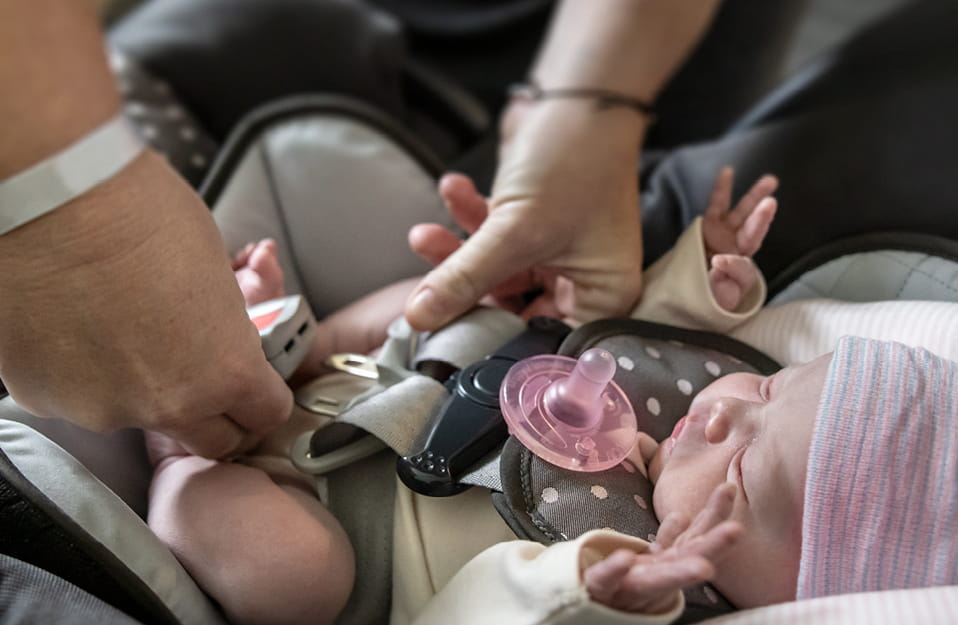4 things to remember after a miscarriage
You may experience a wide range of emotions when recovering from a miscarriage. Here are 4 things to keep in mind as you begin to heal.
If you’ve had a miscarriage, you may be experiencing a wide range of feelings — from confusion, shock and numbness to anger, jealousy and sadness. You might even feel guilty for not experiencing grief.
“These are normal responses to miscarriage or any pregnancy loss,” explains Julie Hergenrather, PhD, psychologist at Geisinger. “And you’re allowed to grieve as much or as little as you need to right now.”
What is a miscarriage?
A miscarriage is the sudden loss of an embryo or fetus in the first trimester. After 20 weeks, the loss of a fetus is called a stillbirth.
Usually, the first signs of a miscarriage are heavy bleeding accompanied by abdominal pain or cramping. If you’re experiencing these signs, contact your doctor right away. If your symptoms are severe, head to your nearest emergency room or call 911.
Miscarriages may occur because the baby isn’t developing as expected. Reasons for this can include genetic or chromosome abnormalities in the growing baby to an underlying health condition in the mother, like an abnormally shaped uterus. But in most cases, the cause of a miscarriage simply can’t be determined.
“While there are some factors that can increase your risk of miscarriage, they typically aren’t caused by something you did or didn’t do,” explains Dr. Hergenrather. “This ‘unknown’ can be especially difficult to cope with, but it’s important to remember that it isn’t your fault.”
After a miscarriage: How to cope
Your doctor will help support you through the physical process of a miscarriage, but they can also connect you with resources to support your emotional well-being.
“During this time, it’s important to be open with your loved ones and healthcare provider about how you’re feeling — physically and emotionally,” says Dr. Hergenrather. “It can really help.”
Many women go on to have healthy pregnancies after a miscarriage. But that doesn’t make any present grief easier. “Don’t rush your grieving process,” advises Dr. Hergenrather.
Here are 4 things to remember as you heal
1. It’s not your fault
Guilt is a common emotion after a miscarriage. You may wonder what you might have done wrong, or if there was something you could have done to prevent it from happening. This may be especially true if the cause of your pregnancy loss is unknown.
“With the vast majority of miscarriages, there’s usually nothing anyone could have done differently to prevent it,” says Dr. Hergenrather. “Try to remind yourself that it wasn’t your fault.”
2. You’re not alone
If you’ve recently experienced a miscarriage or pregnancy loss, you may feel like you have no one to turn to, or that you should keep your emotions to yourself. But it can be healthier to express yourself.
Whether you talk to your partner, a loved one, or members of an online or in-person support group, sharing what you’re experiencing can help — and you may even find an unexpected support system in the process.
“Do what feels right for you,” says Dr. Hergenrather. “You don’t have to share every detail if you don’t want to, but talking to someone about what you’re going through can have a healing effect.”
3. Take care of yourself
As you work through your grief, don’t forget to take care of yourself physically and emotionally — even if that’s a challenge.
Do your best to eat nutritious meals, stay hydrated and move your body (once your doctor gives you the okay). “Getting out for daily walks, for example, can help support your physical and mental health,” adds Dr. Hergenrather.
When it comes to your emotional needs, don’t ignore them. “Try not to avoid your feelings,” says Dr. Hergenrather. “Take time to cry, feel frustrated and angry.”
And don’t feel guilty if you aren’t always mourning. “Don’t be afraid to laugh or feel joy, too,” Dr. Hergenrather adds.
4. Help is out there
After a miscarriage, it’s normal to have good and bad days, but you should start to feel better over time. “There’s no timeline for grief,” explains Dr. Hergenrather. “You may feel ‘normal’ one day and then your grief may hit you another day. This is normal.”
However, if after some time you continue to have more bad days than good, it may be time to seek professional help. “If you find that you’re experiencing symptoms of depression, like lack of energy, trouble sleeping and loss of interest in things you once loved, reach out to your healthcare provider,” says Dr. Hergenrather. “Remember, there’s no shame in asking for help.”
Experiencing — and recovering from — a miscarriage or pregnancy loss isn’t easy, but showing yourself some compassion can go a long way in helping you heal.
Next steps:
Meet Julie Hergenrather, PhD
Learn about pregnancy and infant loss support





